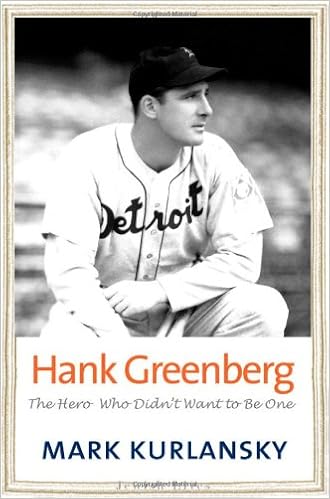
It's important to understand up front that Hank Greenberg: the Hero that Didn't Want to be One is part of the Yale Press Jewish Lives series. The series contains short (approximately 150pp) biographies designed to "explore the breadth and complexity of Jewish experience from antiquity through the present." So, we know not to expect a standard sports biography, or even one that captures every facet of Greenberg's life.
On those terms, this is a remarkable book. The book's subtitle, although a bit awkward, captures its thesis nicely. Despite being born into a Jewish family, Hank Greenberg was virtually non-observant and disliked the attention he received as a "Jewish" ball player. Kurlansky spends substantial time on the episode where Greenberg decided against playing on Yom Kippur, revealing that had it been left to Hank, he certainly would have played. His parents' expectations and other social pressures, not his personal religious devotion, kept him away from the ballpark that day.
Escaping the tag "Jewish ballplayer" though, would prove impossible for Hank. Most newspaper accounts would mention it. He would be heckled tremendously for it (though not as bad as Jackie Robinson would endure later). He quickly learned, however, that ignoring hecklers was the only effective means to combat them. He used the heckling to spur him on to greater degrees of excellence. He even denied that anti-Semitism was at play during his chase of Babe Ruth's home run record in 1938 (he finished with 58). Later in life he even yelled at an elderly fan who brought it up. Greenberg simply did not like the fact that his Jewishness would color his achievements or even his failures. He could, however, not escape it.
Kurlansky devotes substantial pages to Greenberg's marriages, relations with his children, and post baseball activities and life. He spent some time as a baseball executive with the Cleveland Indians and owned a part of the Chicago White Sox. But after a short time, he was simply done with the game, and moved on to enjoying his retirement, mostly at his tennis club, learning to appreciate fine art, food and wine, and spending time with friends and family. According to Kurlansky, despite all of his hard work to make a career in baseball "baseball was not the goal of Greenberg's life; it was a tool for achieving his goal" - escaping the Bronx and making a comfortable life.
One omission I find odd concerns Greenberg's trade to Pittsburgh for his last season. According to The Life and Times of Hank Greenberg (a tremendous video documentary), the trade occurred after Tiger ownership saw a photo of Greenberg in a Yankees' uniform, and thought he wanted to be traded (in fact, it was a photo from a charity game). Kurlansky does not mention (nor dispute the veracity of) this story.
In sum, however, The Hero Who Didn't Want to Be One serves its purpose very nicely, illustrating how Greenberg's religion played a role in his life even as he tried to disavow it. It was only later in life that Greenberg realized how much his career meant to other Jews, and embraced that aspect of his career. It reminds us that while we can't change who we are entirely, we can live life on our own terms, as Hank Greenberg did his.
No comments:
Post a Comment